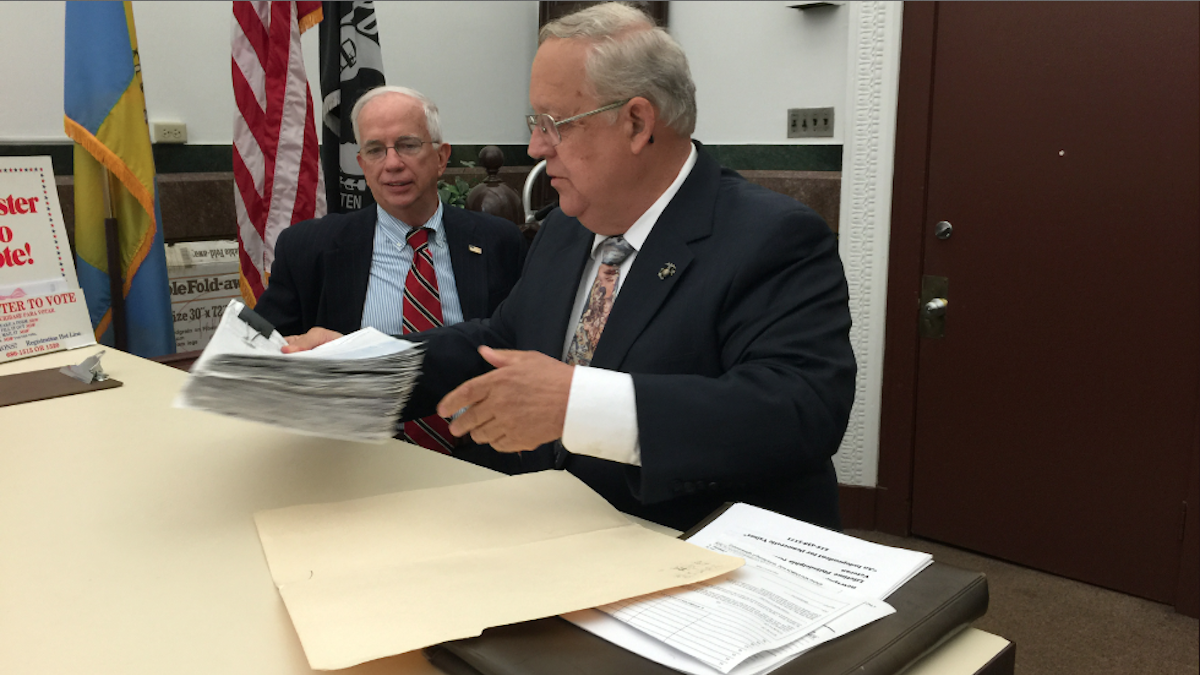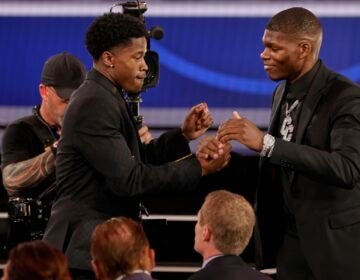Jim Foster channels Truman and the fifties in his 2015 mayoral campaign

Mayoral candidate Jim Foster (Ind.) says his campaign will mimic 'one of the most successful and unexpected reversals of fortune in American political history.' (Brian Hickey/WHYY)
When community newspaper publisher James Foster submitted more than 3,000 signatures to launch his mayoral candidacy as an independent last month, he said his last-minute decision was in part spurred on by Sam Katz and Bill Green both deciding not to enter the fray.
Having briefly faced a petition challenge backed by city Republicans, Foster plans to launch his campain in earnest after the city returns from its summer mental hiatus, traveling across Philadelphia in his classic Cadillac convertible and speaking to any civic group who will have him.
Political landscape
Much like when he ran for a U.S. House seat with an “anyone but [Chaka] Fattah” mindset in 2012, the irascible 72-year-old with an itchy send-email trigger finger hopes his independent candidacy will tap into a voting bloc that has had enough of Philadelphia politics as usual.
It’s a five-candidate race, and four of them are widely considered longshots at best. Still, Foster hopes to be heard during a quartet of debates leading up to Nov. 3. It’s not yet known how many of them will invite the entire field, not just Jim Kenney (D) and Melissa Murray Bailey (R).
He’s already sent out a 10-point “Mayor Platform” (PDF) that includes plans of action like “Accept resignation of all appointed officials making it clear that they will be filled by the qualified regardless of political party or background” and “Effect major reforms of all city revenue and taxing departments that today are silos of authoritarian incompetence.”
Foster has used his Independent Voice newspaper and a brief stint hosting an hour-log program on 900AM WURD to rail against corruption and fiscal wastefulness. (He claims “unknown individuals” hacked into the phone lines to ensure he couldn’t receive any calls on that Sunday night show that he paid $350 to host weekly.)
He said his candidacy depends on a Harry Truman mindset to bring about the type of upheaval that came when the Republicans were booted off the city’s political mountaintop in 1951.
“I’ll be mimicking one of the most successful and unexpected reversals of fortune in American political history,” said Foster. “There have been upsets in the past; I’m hoping to engineer another one. There can be another reform government in Philadelphia.”
Foster’s formal campaign-launch event will occur in the immediate future, but he sat down with NinetyNine to discuss what got him in the race and the strategy that he claims can lead him to victory.
The candidate speaks
On the debates: “Hopefully, they’ll include me. I think I have enough of a track record of credibility that it shouldn’t be a question. I’m just as entitled to be on the ballot as anybody else. There’s no reason in the world I shouldn’t be in the debates.”
On his approach: “I am going to mimic the Joe Clark/Richardson Dilworth election. We’ve only had one major reform governement in the history of Philadelphia. That was in the early 1950s. That’ll be the tie in and I’ll talk about the critical mass of malfeasance which has reached at least the level it was then, if not worse, and that will lead into my platform items.
“There was a very powerful machine that ran government for 65, 70 years, the Republican machine, and it was considered unbeatable. But, some aggressive exposé work of wrongdoing came to the surface and a bunch of people voted against their party. It’s not impossible for that to happen. I’m going to use some quotes and cliches from those days that will be attention grabbing.
“These two quotes from President Harry Truman and [legendary boxer] Joe Louis sum up my campaign: ‘The Buck Stops Here’ which covers finances and who’s responsible for it, and ‘You can run but you can’t hide.’ The people get together when they’ve had enough and reformers can take hold.”
On strategy: “What I hope to do is visit every neighborhood in the city. I’m going to schedule a tour, a map of what I’d like to do, like the Truman ‘whistlestop tour.’ Who knows how many folks at various community centers or rec centers will send me an invitation and are willing to listen to my story.
“I want to buy some air time and do one- or two-minute commercials introducing myself and saying, ‘We’re doing a citywide campaign. We will come to your neighborhood, your rec center, your church. Give us a call, tell us where you are and the campaign convertible will be there.’ That’s going to be one of the ways I’m going to get in the game. As often as I can do it, I’ll be somewhere every day, every evening. We’ll be sending out flyers, inserts in the paper, using Facebook to spread the message that the city needs a top-to-bottom overhaul.”
On the city’s administrative structure: “We have a city top-heavy with what I consider to be overpaid, underperforming administration/management types of various forms, czars that [Mayor Michael] Nutter created. He really ramped up the executive offices of the city unnecessarily. Some are duplicates. We have four aviation executives all making more than $120,000?
On L&I: “When Nutter won his first term, one of his campaign promises was that ‘I’m going to blow up [the city Department of Licenses and Inspections].’ And, as soon as he got elected, he put someone with no experience tied to L&I in the past. These positions were once held by people with that kind of experience.
“They came into L&I and literally put decision-making power into the hands of young, untrained clerks. The whole internal situation at L&I, it turned into chaos. The laptops they gave to inspectors didn’t even work inside the buildings they were inspecting! Permits were issued to people who never should have gotten them because information wasn’t at the hands of the people making the decisions.
“The tragedy of tragedies is the Salvation Army situation. This is for the record: I went to every one of the City Council hearings on that.
“The day after that building collapsed, I called somebody I knew at L&I, a senior guy who had been there a long time. I said, ‘What’s going on here with that permit issuance?’ and he opened the file and read to me what was in it. There were two documents in the file. One was an insurance binder on a pickup truck. The other was a letter that said ‘I have no employees’ signed by the owner of the company. He said that the revised policy of L&I is if you are a contractor, you can send us a letter saying you have no employees and we won’t ask you any questions about who’s doing the work. That’s all you had to have. Nothing else. Now, we all know that guy should no more have had that permit than the man in the moon. It’s insanity.
“That doesn’t tie to Kenney. That ties to a city that’s in freefall. The failure is enormous and Nutter has done nothing but make excuses for [L&I Commissioner] Carlton Williams.”
On impressions that Philly is on the rise: “What we have had is a one-party machine that runs a government of distraction. They distract the people as much as possible from the real failures of the underpinnings of government with superficial projects. We’ll talk about new bike paths or merging Parks and Recreation, while in reality, what we have in Philadelphia is a city that the greatest example of the broad difference between the haves and the have-nots.
“I don’t put all this on Kenney. Kenney is just another cog in the machine that’s created this.
“People with half a brain who want to stay in the city, who think the city has a bright future, have to face the reality that it doesn’t matter how we got here, we are here. If you’re going to put blinders on and think you can ignore all those parts of Philadelphia that don’t even have the beginning of self-sustenance going for them, you’re just going to leave them to metastasize and get worse, and raise taxes on the other people to pay the subsidies, to let them become a Badlands you never go through?”
On how dwelling on the past will play with forward-looking voters: “The future I’m talking about is one where we don’t throw money down the sewer and instead, create opportunity for the rest of the city.
“[U.S. Rep.] Chaka Fattah brings $1 million a week to the University of Pennsylvania and doesn’t do one thing to jumpstart entry-level economic enterprise in Southwest Philly. … You got a lot of subsidized elites, mostly white, who come in and do all these kinds of urban studies and the dependent black underclass is like their Petri dish to study. Then, they go home at night and live off their healthy salaries. Why can’t we take those capital dollars and create enterprise zones that are not just back-door sweetheart deals for developers who fail?”
On his pitch: “I’m not going to talk about too much esoteric stuff to the average community group. I think I can make a pragmatic argument that will resonate with all types of people. Regardless of how we’ve gotten this bad, the other [candidates] have no plans to change it. They’re manicuring around the edges.”
WHYY is your source for fact-based, in-depth journalism and information. As a nonprofit organization, we rely on financial support from readers like you. Please give today.




